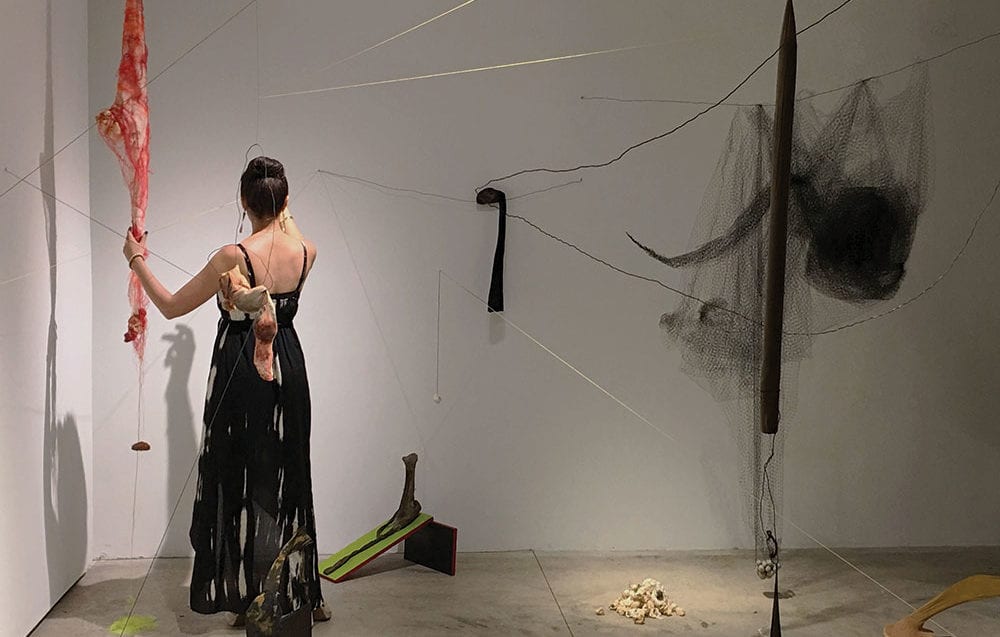Once there was a particular MARTA bus stop on Peachtree Street in Atlanta, Georgia that Carla Contreras used to spot from the train station at the Savannah College of Art and Design (SCAD). Some might have called the bus stop insignificant, even a blemish on the cityscape, or maybe it was their lifeline to the rest of Atlanta. Contreras, who finished her M.F.A. a year ago, was creating art from her parents’ home in Ecuador long before she set foot on campus at SCAD. Both of her parents are architects, and the Atlanta artist remembers being curious about the materials her father worked with even as a child. She coveted his watercolors and the weighty, lusty papers he kept of different textures, color, grain, and weight.
His dream was to be an artist, and it seems that Contreras has fully embraced the inheritance of this shared multigenerational dream. Transplanting herself to a foreign country made Contreras keenly receptive to her new community: the Peachtree bus stop sheltered a homeless woman, and one day, Contreras noticed that the bench had been removed and the woman vanished. Contreras found herself viscerally reacting to the woman’s sudden absence. “Since then I started being more aware and inquisitive about my surroundings, I started to become a type of flaneur,” she says.
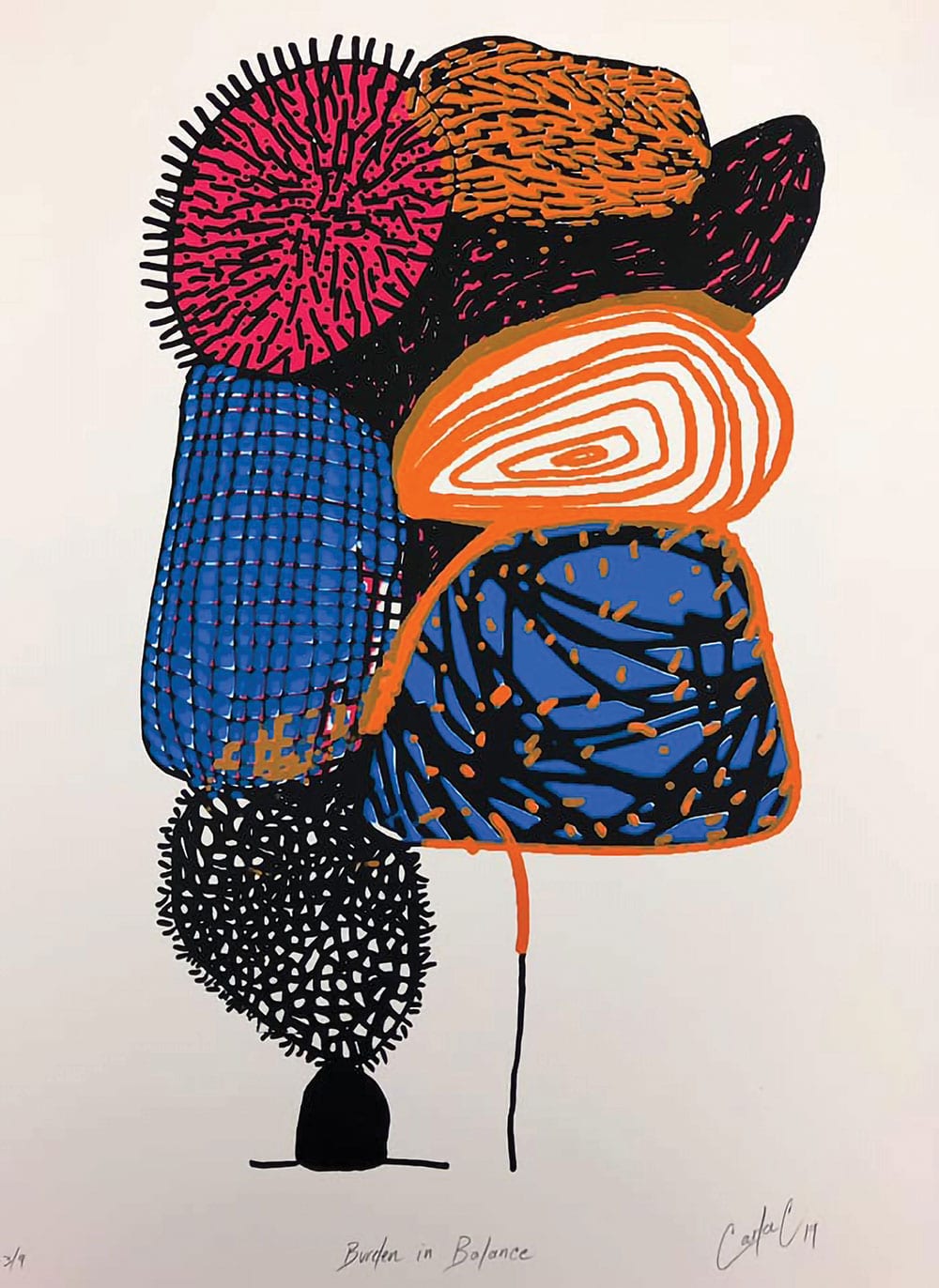
A print by Contreras acquired by SCAD President, Paula Wallace, during Open Studio 2019.
The experience made an impact on her core values and identity as an artist. Contreras’ impartial exterior is home to roiling internal observations every time she goes outside. “It is and will always be paramount that there is someone who can give his time to interpret the world and think about what nobody else has time to—for the sake of what makes us human and attaches us to our inherent natural qualities, which is what differentiates us from machines.”
Contreras in not a machine.
Good art is the perfection of beauty and luxury. At least, this is what we are taught to believe by the traditional art canon and certain Connoisseurs of taste. But if you ask Contreras, good art is socially based—like osmosis. According to the Atlanta artist, good art is a result of moments like the Peachtree Street incident (she actually turned this into a video installation titled Removal in 2019). While still a graduate student, she immersed herself in internships, attended show openings, submitted work to local open calls, and connected with SCAD Arts Sales, which bills itself as “a full-service art consultancy.” “Art responds to an intrinsic human necessity to reflect on the world within and around us,” she says.
She understands her studio as a “laboratory” and has adapted her practice to be more “process-based,” with the result that her professional and personal lives have married into one another. Contreras’ art invites us into an ongoing dialogue between her comfort and a version of the world that is different, and sometimes dissonant, from hers. “I believe that making art should be a constant search, a constant challenge, a constant process of reinvention,” she tells me. “The moment I start feeling too comfortable with my process or technique, I feel the necessity to make myself uncomfortable again.”
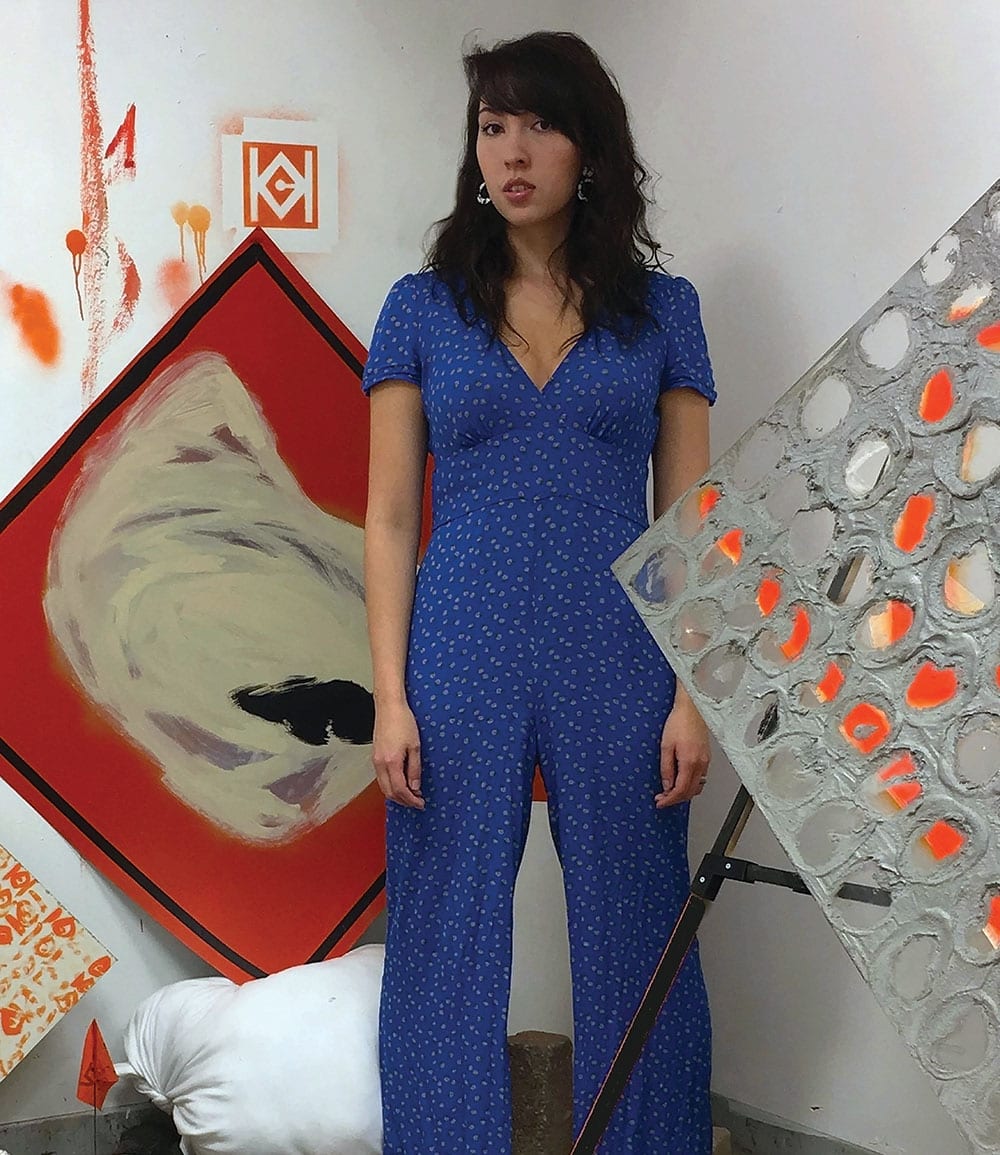
Contreras was featured by Georgia Women in the Arts in a piece about how she uses art to make change and drive awareness on globally relevant issue.
Atlanta Art Galleries
Over the past four years, her work has been shown at MINT Gallery at the MET Atlanta, Besharat Contemporary, the Museum of Contemporary Art of Georgia, Coca-Cola Headquarters, and Johns Creek and Callanwolde Fine Arts Center. She challenges spacial construction in the footsteps of Dali; treats shapes and anatomy like Nara; and makes love to color like Basquiat. “My driver to make art has to do with being drawn to personal and social ambiguities, stubbornness, and inquisitiveness,” Contreras says. Her thesis show was composed of paintings, drawings, prints, objects, and video installations that examine the nexus between urban development, decay and stagnation, conditional fragility, and human interaction.
There is something gnostic and disarmingly—compellingly—universal about Contreras and her work. One origin of this global touch is her transition from living in a developing nation in South America and having to reckon with the double-faced American ideal of progress and a “collective imaginary ideal.” She dismantles borders and creates bridges in her work. The Atlanta artist eats a consistent breakfast: Espresso macchiato, scrambled eggs with cheddar cheese, Maria cookies, queso fresco, and carbonated water. She paints in the morning to take advantage of natural light. She checks her emails. These days she works in her studio later into the evening and takes time to connect with nature.
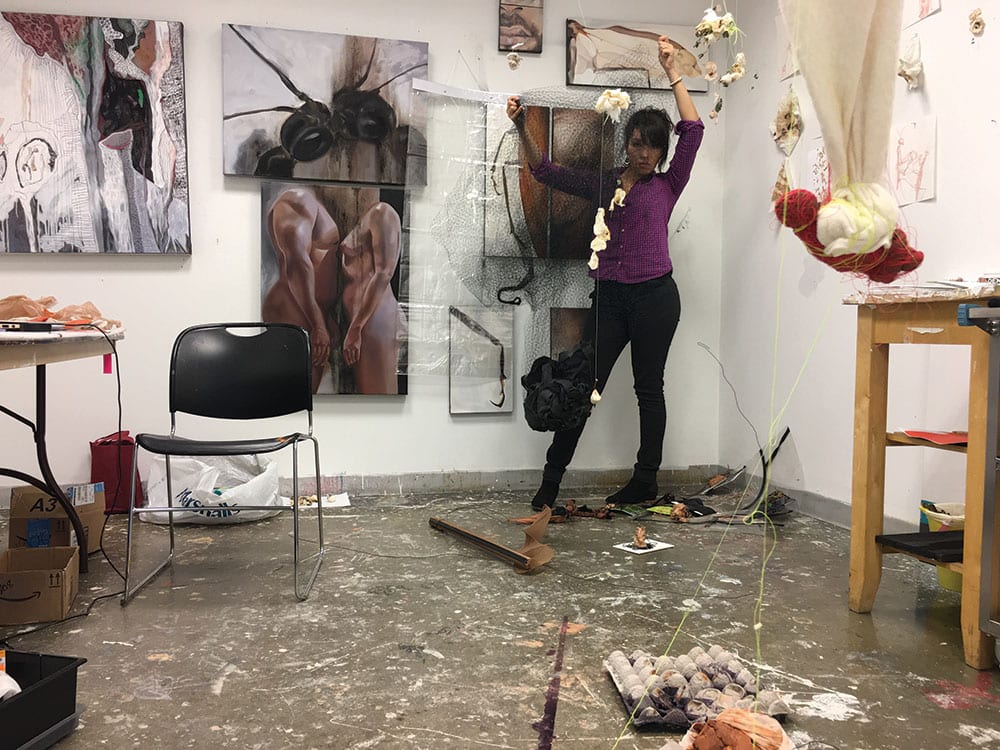
In her Atlanta studio, where Contreras explores new materials and processes as part of her practice.
Atlanta, Outdoors
She walks to Stone Mountain Park outside of Atlanta three times a week and appreciates the synchronous puzzle of ecosystems and “the silence, the sounds of insects, birds, and little creatures.” It is vital that she has kept this routine; nature grounds her to the miracle of existence. Contreras is an avid reader. She collects questions about the human experience like other people tend to collections of stamps and plants—the thoughts germinate, grow, produce a kind of pungency, and ultimately serve her well. She has recently finished the graphic novel Unflattening by Nick Sousanis and The Sane Society by Erich Fromm. She lets books lead her into such ethical inquiries as how governments produce and shape individuals without agency, robotism, and the impulsive mechanics of social pathology.
In each literary encounter, Contreras searches for connections with the book’s context and her own lived reality, and her shuttling thoughts tangle like planetary tendrils. Despite her pandemic-related confinement at home, where her apartment is now the stomping ground of her Jack Russell Terrier, her husband and herself, the Atlanta artist feels an intense sense of community. She is actively reevaluating what it means to be a member of a community and the inherent responsibility of that task in the midst of current events. She works part-time as a visual and performing arts teacher at Pace Academy and will be an upper school yearbook advisor there in the upcoming academic year. Her role as art teacher is a predominant part of who she is: “Education is necessary so we can learn from each other and pass on valuable information, practices and understandings of the world.”
COVID Creations
When instructing students, Contreras is concerned as much with the heart as she is with cultivating the mind. Her most recent project is already—although not prematurely—considering what world we will discover and inhabit on the flipside of the global coronavirus pandemic. Will art survive in this time? Will Contreras’? The process of art-making has taught her to revisit the definition of “artist” to care for more than what exists within the studio: she is her own accountant, marketing manager, curator, and critic.
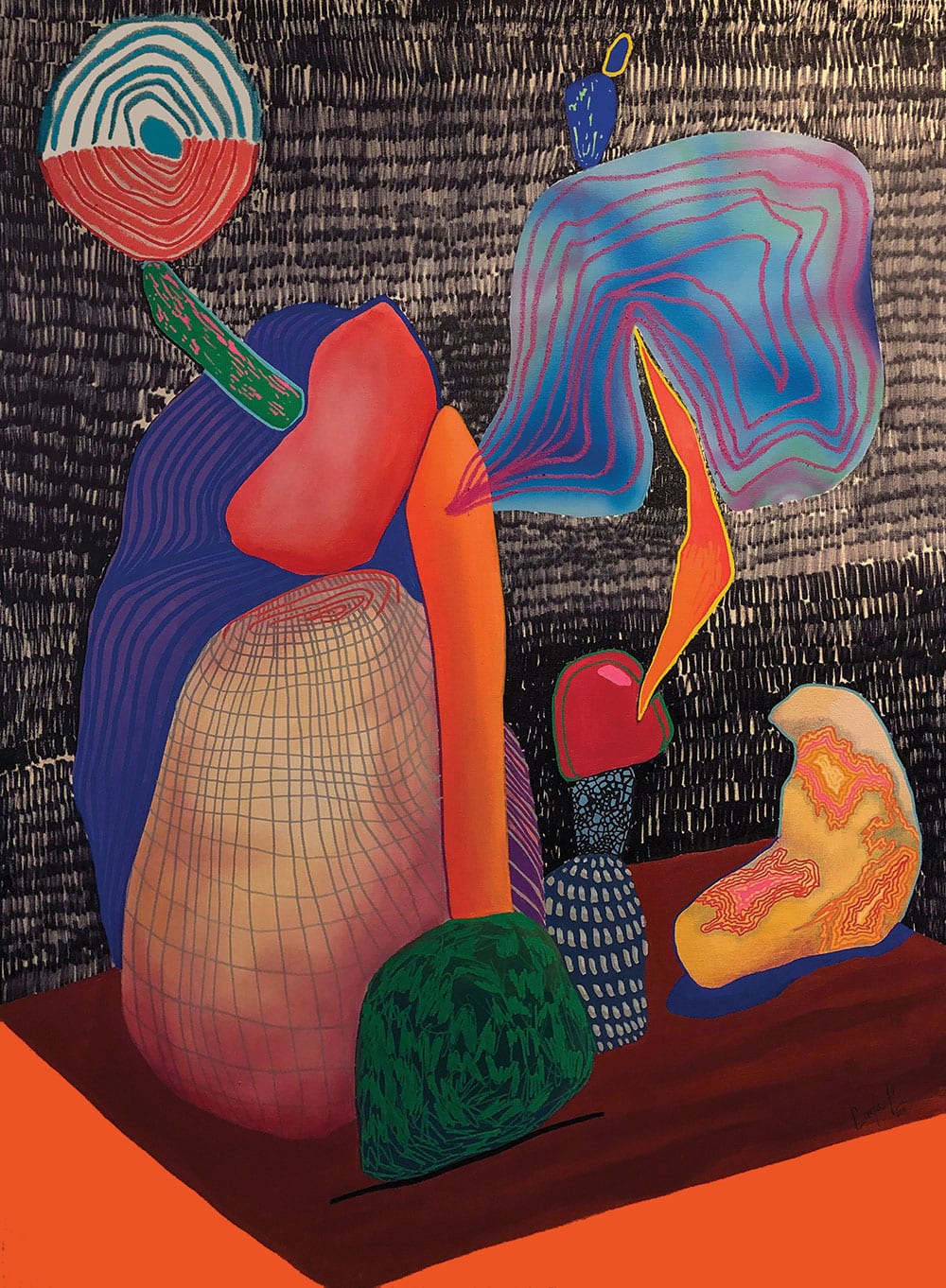
Nightfall, Carla Contreras, mixed media on canvas, 48” x 36″.
Coronavirus has further pushed her to crave more from the role of “artist” as well; it exacerbates and illustrates the social disparities Contreras gives an abstracted voice to in her art. “The struggles, the encounters, the hope, the injustice, the lifestyle, the control, the freedom, the madness, the human condition are what moves me, what awes me, and what makes me wonder,” she says. She spent the past two months composing a series of small mixed media works titled Wonderer of the Rock during Pandemic Times, which examines the formal aspects of mineral, stone, and living organisms on quartz monzonite igneous rock from her visits to Stone Mountain.
Now more than ever, the Atlanta artist sees art intersecting the rest of society by becoming a source of empathy, trust, imagination, and hope. She is at the forefront of the next revolution in the art world. Art as kindness. Art as peace. Art as a testament to mental health. This is Contreras’ meditative contribution to the agency of art in our lives: “The role of artists is to create a platform with their work to share preoccupations, curiosity, and obsessions.”
Written by Jean Li Spencer

